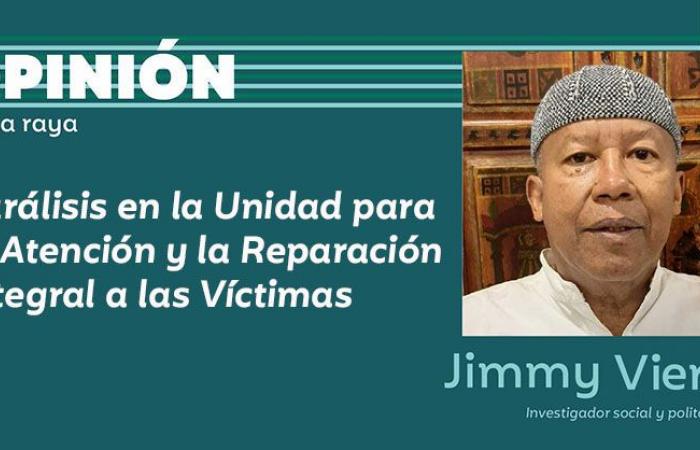By: Jimmy Viera Rivera
The Government of Change faces the claim of nine million victims and, therefore, it is urgent to resume the capacity of administration and comprehensive execution of its most important policy: the well-being of this population.
The objective of every government that proposes change is to remove the stagnant waters of institutions mired in morass, corruption and deep decadence caused by decades of neoliberal culture.
The entity that governs the victim policy is going through its worst crisis in the midst of an armed conflict that does not end. The Victims Unit, without a defined direction, with an interim director who was asked to resign, but was not accepted, experiences an environment where systematic mistreatment and dismissals by this official predominate, who, to complete the critical picture , was forced to resign mainly for political reasons. The ASI political party, to which she belongs, is one of those that helped sink the health reform in the Seventh Commission of the Senate, in addition to switching from the government coalition to the right-wing opposition.
The critical assessment of the Victims Unit reveals several facts that have given rise to weak management during the period of the current government.
One of the instructions given to the director was to prepare a reform to the victims’ law, in accordance with its importance in the Government of Change, articulated with the territorial vision and the total peace processes. However, before presenting the bill, by the Unit, three reform projects to Law 1448 were filed. Faced with this situation of loss of the government initiative, the director eagerly tried to prepare the project, but it suffered from many legal and conceptual weaknesses, an incomprehensible situation regarding an entity with the institutional capabilities it possesses.
The director did not appear in sufficient time for a process of conciliation of the bills, necessary to assume government leadership; On the contrary, her priorities were to attend to other matters (which are not known), during prolonged commissions outside Bogotá, in addition to her repeated absenteeism. The same, her resistance to changing norms and resolutions with a pro-victim sense to eliminate access barriers.
The Unity crisis is palpable proof of management based on a personalistic political project, to the detriment of a collective project of the country and the government. This explains the handing over of key positions to groups of trusted officials from the previous government, who They have put a handbrake on the implementation of the law and create barriers, as well as the exclusion of professionals close to the Historical Pact.
After two years of government, the Unit continues with the same investment chips of the Duque government. It is understood that these correspond to and interpret the law, but it is also important to consider that there is a margin of discretion on the part of the current government to add or adopt new actions aimed at comprehensive reparation for victims and new situations. However, it has been unable to adjust the investment chips in accordance with the government’s vision and today’s reality.
A fundamental principle of Law 1448 is transformative reparation. This is not the result of the process at the end of many years of waiting on the part of the victims, but rather begins from the moment they relate to the Unit and, therefore, implies a transformation in the quality of communication between both. parties, to provide a place for victims, instead of continuing to treat them simply the same as previous governments, through a cold service window that represents a barrier to access to rights, in addition to impersonal treatment that lacks human sensitivity.
In terms of reparation to collective subjects, there has been no relevant progress for 18 months. Of 980 collective subjects, only 15 collective reparation plans have been executed during the time of government.
In the humanitarian aspect, in recent months the Unit has dismantled the responsibility for urgent prevention and government institutional leadership, assigned to it by law, to comprehensively manage humanitarian responses in an emergency context. In addition, the Unit is legally in charge of carrying out urgent prevention actions, with the communities where humanitarian crises occur, to avoid further humanitarian damage in the context of crises. Likewise, it has dismantled the care and prevention strategy for victims of other victimizing events, other than forced displacement. Articulating inter-institutional efforts must be a task to permanently promote, with other state entities, attention to victims of landmines, forced recruitment and use of children and adolescents, terrorist attacks, homicides, kidnappings and gender-based sexual violence.
In the transformation of the institutional articulation instrument (SNARIV) at different levels of public administration to strengthen comprehensive reparation policies for victims, there is no significant progress, a responsibility that cannot fall exclusively on a Subdirectorate, but rather falls on the political force. of the head of the institution.
Another critical issue is the lack of response to the situation of the indigenous Embera communities in Bogotá and other cities, especially when the current director belongs to the Embera Chamí community. When she arrived at the Unit, there were 700 emberas, today there are 2,500 in four shelters, without a national or district response.
The victims’ table, which has been a space for dialogue between the government and the various expressions of the victims, shows signs of being an instance co-opted by the institutions and clientelist relations.
The situation of the Victims Unit in relation to the merit contest for civil servants is special. Its senior management did not advance a contingency plan to deal with the transition, but instead proposed monitoring the officials and harassing them through work charges, to open disciplinary processes instead of generating a friendly transition environment for the officials whose subsistence They depend on their job and, therefore, are under stress due to the uncertainty about their income due to job loss. The Unit does not currently have a transition and induction plan for new officials.
Reorienting humanitarian management and overcoming previous approaches, as well as inefficiency in the administration of the victim reparation fund, are pending tasks. In conclusion, a discouraging balance that is summarized in this sentence: “The Unit is reduced to being a provider of compensation payments.”
The second report of the Follow-up and Monitoring Committee on the implementation of the Recommendations of the Truth Commission is very worrying when it notes: “However, and although significant progress is seen, compensation to victims continues to be given at a slow pace.” significantly slow, despite the execution of the UARIV and the goals of the current National Government. According to the Ideas for Peace Foundation-FIP (2023), even if the “rate of compensation proposed by the government is maintained, the State would take approximately 43 years to compensate the victims who are currently registered” (p. 95).”
The total peace policy, like Chapter V of the FARC-Government agreement, converges with the victim policy, at its apex, the Victims Unit is located. During the two years that remain in the current government, efforts must be redoubled, first and foremost straightening the path of this entity and, therefore, putting in charge a person with sufficient development in legal and peace matters, loyal to the policies. of the government, tuned and committed to the victims, in line with the approach of total peace and reparative action for territories and, with the government program and the development plan that gives central importance to the victims.
Peace without an efficient victim policy is not peace!






